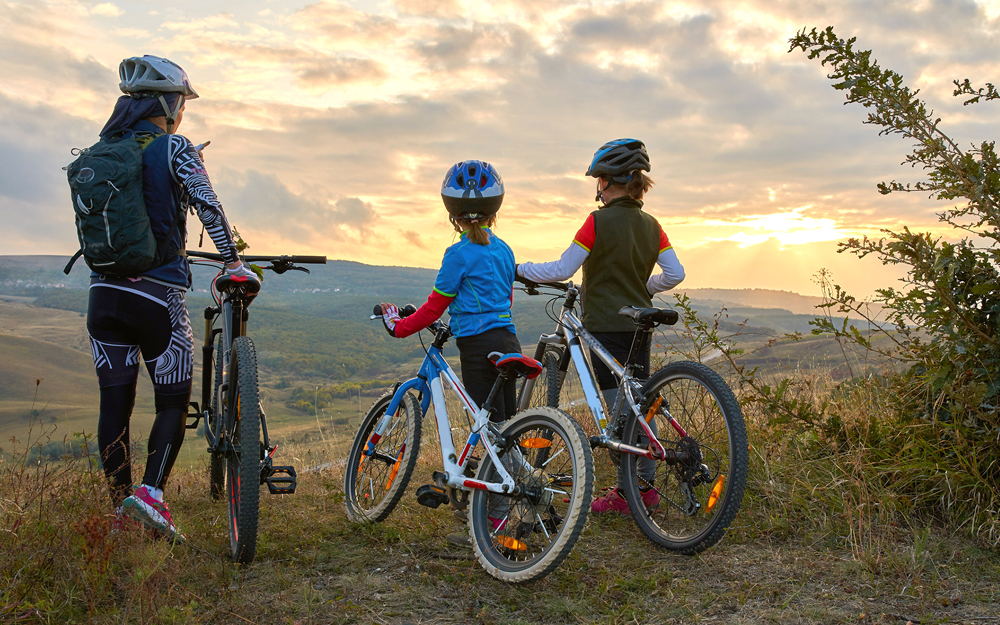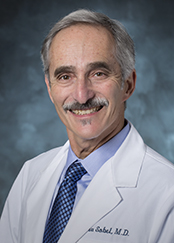Cedars-Sinai Blog
Cycling: Stay Safe and Have Fun
Feb 08, 2021 Cedars-Sinai Staff

At the onset of the COVID-19 pandemic, hot commodities flew off store shelves: flour, toilet paper…and bicycles. After gyms closed and a decline in traffic freed up space on streets, bike sales soared. Across the country and in Los Angeles, people hopped on bikes to get out of the house, try something new or replace their exercise routines.

Irving Sobel, MD
It's still a great time to take up cycling, or any new exercise activity, says Dr. Irving Sobel, an internal medicine specialist at Cedars-Sinai. Dr. Sobel rides an e-bike to work in Marina del Rey some days, and mountain bikes through the Westside's canyons and highlands on weekends. Here, he guides us through what you need to know about cycling: how to start, how to stay safe and why it's so good for you.
Anyone can do it
Bikes aren't just for kids—though saddling up might make you feel like one. Because most of us learned to ride bikes as children, being on one now is a way to relive a lighthearted feeling of freedom and discovery.
"You feel the sun on you, the wind on your face and you observe your environment better by slowing down and biking," Dr. Sobel says. "When you see other bicyclists around you, you wave to them and you appreciate things you normally might overlook."
How to start
Bikes are relatively inexpensive: You don't need a souped-up frame to work up a good sweat or make it to your destination. Many bike shops and online marketplaces offer used bikes for reasonable prices. If you're not sure you want to invest, rent a Metro bike.
Just make sure to always wear a well-fitting helmet, inflate your tires and adjust your bike's seat and handlebars to fit your body. Bike shops can help with this.
If you're new to biking, ease into it with short trips, Dr. Sobel says.
"Start out slow and spend 10 minutes riding your bike to the bank or any simple errand near your house," he says. "For short distances, it can be so much better than getting in a car and driving."
A cycling partner can help motivate you, Dr. Sobel says, so pair up with a friend or family member to make it a social exercise, too. If you don't have a friend to bike with, ask around at a nearby bike shop. Some bike stores form smaller groups that take scheduled rides together—first check local health orders about gathering in groups outside your household.
Stay safe
With few protected bike lanes and a lot of traffic even during the pandemic, Los Angeles' streets can be intimidating. Dr. Sobel avoids biking on major thoroughfares and takes residential streets whenever possible. For those who would rather train indoors, stationary bikes, or stands to convert a bike into a stationary bike, make for a good workout, too.
Out on the roads, Dr. Sobel cautions riders to obey traffic rules and stay observant of everything and everyone on the road around you—even the parked cars. You can also search your neighborhood for bike paths—such as several that line the coast—but just be careful around big crowds on the weekends.
"You do have to be mindful of what is out there with you," he says. "Don't get distracted."
Don't wear headphones while you're on a bike, and keep your phone securely out of sight.
"Using your phone while biking is just as unsafe as using your phone while driving," he says. "If you stop paying attention and hit a curb, the consequences can be serious."
"Patients often think you have to be a vigorous athlete to enjoy the benefits of exercise, but that's not the case. Make it fun and try to find something you enjoy doing—whether it's biking, hiking, walking in your neighborhood or dancing."
Full-body workout
Cycling is excellent cardiovascular exercise—it's easy on the joints and works the whole body. Dr. Sobel incorporated cycling into his exercise routine about eight years ago after a knee injury. As an alternative to running, he picked up swimming and biking for full-body, low-impact workouts.
He says if you're still struggling with the "COVID 15"—pandemic-induced weight gain—cycling can help you get out of that rut, and provide a few other benefits, too.
Exercise helps lower blood pressure, build stronger muscles and bones, and can lower your risk for developing cancer and dementia. Even moderate exercise can help you lose weight, sleep better and improve your mood.
"Patients often think you have to be a vigorous athlete to enjoy the benefits of exercise, but that's not the case," Dr. Sobel says. "Make it fun and try to find something you enjoy doing—whether it's biking, hiking, walking in your neighborhood or dancing."
If you are gearing up for a bike ride, Dr. Sobel says to endure the sweat, don't overdo it and, most of all, enjoy the low-risk freedom.
"Especially now, it's so nice to go outside," Dr. Sobel says. "And the risk of getting COVID-19 on a bike is extremely low."


